ABA Snow Days: 'Storytelling in the Cultural Moment'
 Thursday's Snow Day opening keynote, "Storytelling in the Cultural Moment," brought together four novelists. Moderator Emma Straub (This Time Tomorrow, Riverhead, May 17) welcomed everyone and said she was sorry the panel wasn't being held in person--she'd hoped to sample chili at a place in Cincinnati mentioned by Curtis Sittenfeld in Eligible. Celeste Ng (Our Missing Hearts, Penguin Press, October 4) quickly provided the name of the spot referenced: Skyline Chili. The in-person 2022 Winter Institute wasn't the only thing sidelined by the pandemic. Straub claimed that "novels are a product of their time," regardless of genre, and asked the authors how their books were influenced by local and global events.
Thursday's Snow Day opening keynote, "Storytelling in the Cultural Moment," brought together four novelists. Moderator Emma Straub (This Time Tomorrow, Riverhead, May 17) welcomed everyone and said she was sorry the panel wasn't being held in person--she'd hoped to sample chili at a place in Cincinnati mentioned by Curtis Sittenfeld in Eligible. Celeste Ng (Our Missing Hearts, Penguin Press, October 4) quickly provided the name of the spot referenced: Skyline Chili. The in-person 2022 Winter Institute wasn't the only thing sidelined by the pandemic. Straub claimed that "novels are a product of their time," regardless of genre, and asked the authors how their books were influenced by local and global events.
Jennifer Egan (The Candy House, Scribner, April 5) replied first, saying, "Fiction is the artifact of the collective dream life of the culture that creates it." She started The Candy House in 2012, what she called "a very different moment," but said that even then she'd posited an event in the novel called "The Rupture." A Visit from the Goon Squad had its own "rupture": 9/11. At first, Egan thought Trump's election would be the Rupture, then Covid came along. "I got rid of the word 'Rupture,' " Egan said, but such a moment always seemed to be in the offing. Egan started Manhattan Beach (Scribner, 2017) at the same time as The Candy House, but set the latter aside to finish the former.
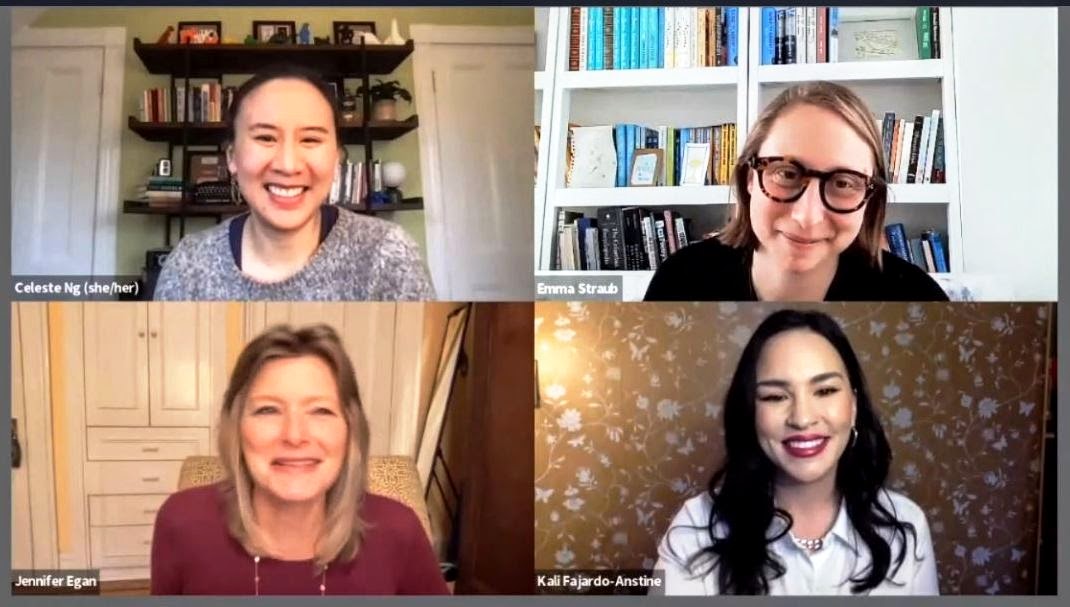
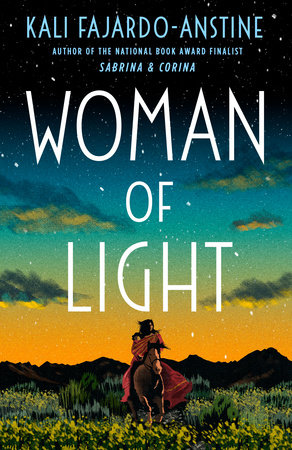 Kali Fajardo-Anstine won the prize for longest gestation period: she started Woman of Light (OneWorld, June 7) in 2005 but set it aside while earning her MFA because her instructors wanted short stories (she published her thesis as Sabrina & Corina: Stories, a 2019 NBA finalist). At the height of Covid last summer, "with marches snaking by, I watched the distance between my two timelines [in Woman of Light] severed," she said. Once OneWorld accepted her short story collection, Fajardo-Anstine's editor asked her if she had a novel. As a matter of fact, she did.
Kali Fajardo-Anstine won the prize for longest gestation period: she started Woman of Light (OneWorld, June 7) in 2005 but set it aside while earning her MFA because her instructors wanted short stories (she published her thesis as Sabrina & Corina: Stories, a 2019 NBA finalist). At the height of Covid last summer, "with marches snaking by, I watched the distance between my two timelines [in Woman of Light] severed," she said. Once OneWorld accepted her short story collection, Fajardo-Anstine's editor asked her if she had a novel. As a matter of fact, she did.
When Straub asked Ng if she had "a secret story collection," Ng answered roundly, "No! I find it hard to work in that scale, tight and compressed. Novels give me more room." Seeing so much in the news about attacks on Asian Americans was something Ng felt she had to address: "It worked its way into the book and became a seed around which the novel arranged itself." Referring to herself and the three panelists, Ng said, "All of our novels feel like they're set in our world." She added that Egan's book--about erasing memories--feels very real: "Our novels say something about our moment and also 'of' our moment."
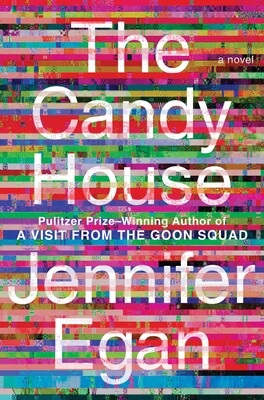 Egan writes as escape. For The Candy House, she wondered, "What would it be like to have a world in which I could look through the eyes of people I have no access to?" She observed, "Anything image-based starts on the outside, but fiction starts on the inside."
Egan writes as escape. For The Candy House, she wondered, "What would it be like to have a world in which I could look through the eyes of people I have no access to?" She observed, "Anything image-based starts on the outside, but fiction starts on the inside."
"I love that!" Fajardo-Anstine responded. Her own ancestry, a mix of Chicana, Jewish and Filipino, drives Fajardo-Anstine's desire to show readers how to look at her family and see them as part of the American story. She cited a teacher at her predominantly LatinX high school in Denver who discussed the historical presence of the KKK in their city as "more of a social club." The KKK had terrorized Fajardo-Anstine's family in Denver in the past, and she watched the other students shift in their seats: "No one raised their hand and said, 'That's not true.' "
Straub suggested that "the need for novelists has grown; what about the role of novelists?" For Egan, "My feeling about what I'm trying to do hasn't changed at all: to be a vehicle for the culture around me, and to distill it in a novel. Entertain first." Egan aims to present in each novel "an intellectual girding of ideas, a sense of the world around it, and to have fun." When Egan was researching the 1930s for Manhattan Beach, her preferred resource was fiction: "It gives you cultural context, cultural assumptions, the things authors aren't necessarily conscious of."
When Ng begins a novel, there's "no topic or idea in my mind, it's always the people. Why are these people so fascinating to me? What's shifted is my risk tolerance; how closely am I willing to look at things that make me feel uncomfortable? My role hasn't changed, the world has pivoted." For Fajardo-Anstine, research has become her obsession. And the best resources are often the people in her own family: her great-grandfather who arrived from the Philippines, her great-grandmother born in 1912.
Egan echoed this idea of curiosity: "Fiction for me is about asking questions and not answering them." She contrasted this with her previous work as a journalist, which was intent on fact-finding. "It's about honoring and confronting the mystery, human life and human consciousness." Ng concurred, saying she couldn't write when the pandemic first hit. She felt trapped in her house. When she began taking walks, she realized what she was missing, "that feeling of discovery, that sense of there could be more to the world than we know--that's why I write fiction." --Jennifer M. Brown










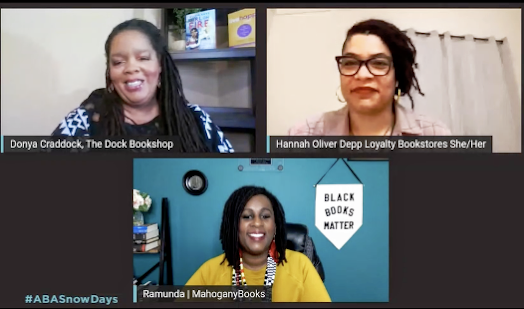 Depp noted that as a Black bookstore owner one never makes a "business decision in isolation." In addition to the existing difficulties of running a small business in America, every choice made in the store suddenly carries extra weight. Young agreed, saying that while some booksellers have the luxury of being able to make purely aesthetic choices about things as minor as tablecloths and scented candles, she considers every choice through the lens of how it will affect and reflect her community.
Depp noted that as a Black bookstore owner one never makes a "business decision in isolation." In addition to the existing difficulties of running a small business in America, every choice made in the store suddenly carries extra weight. Young agreed, saying that while some booksellers have the luxury of being able to make purely aesthetic choices about things as minor as tablecloths and scented candles, she considers every choice through the lens of how it will affect and reflect her community.
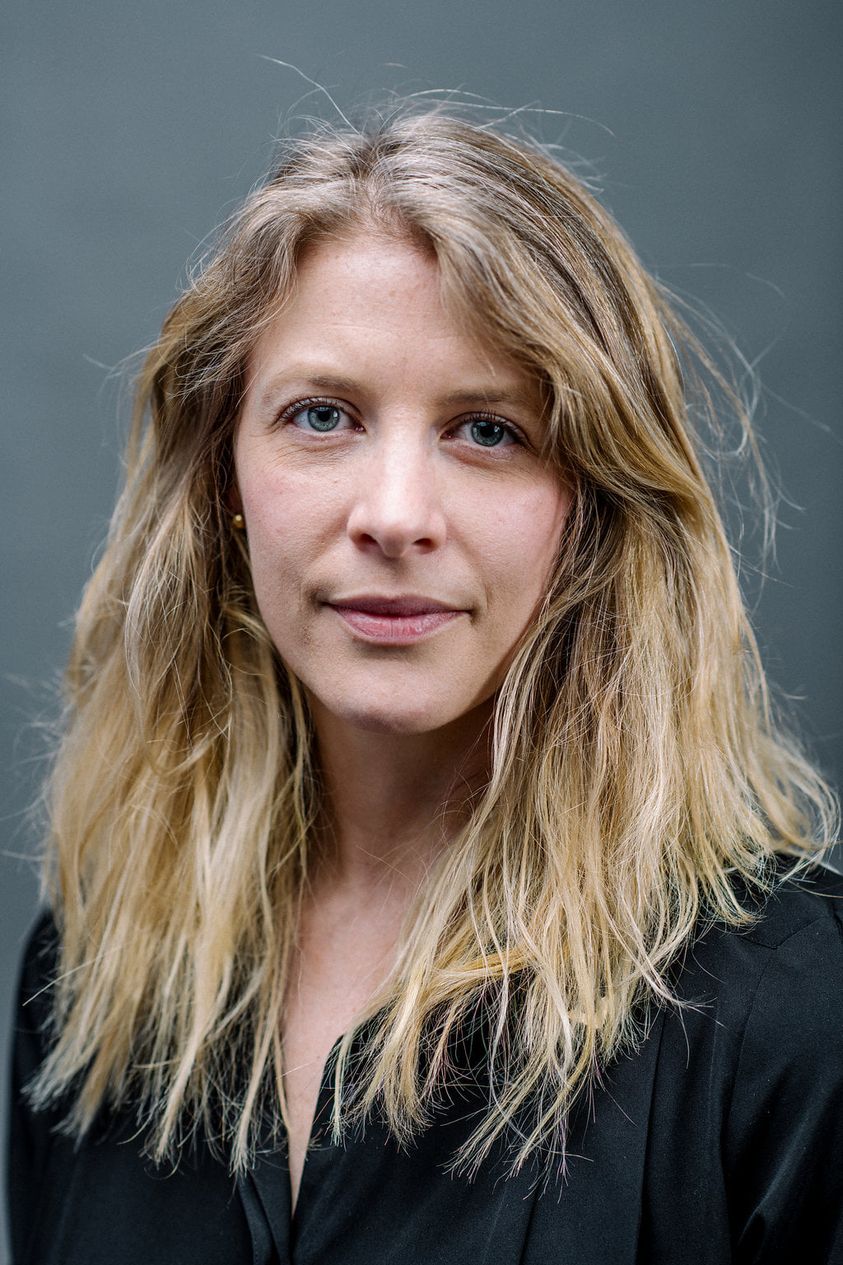

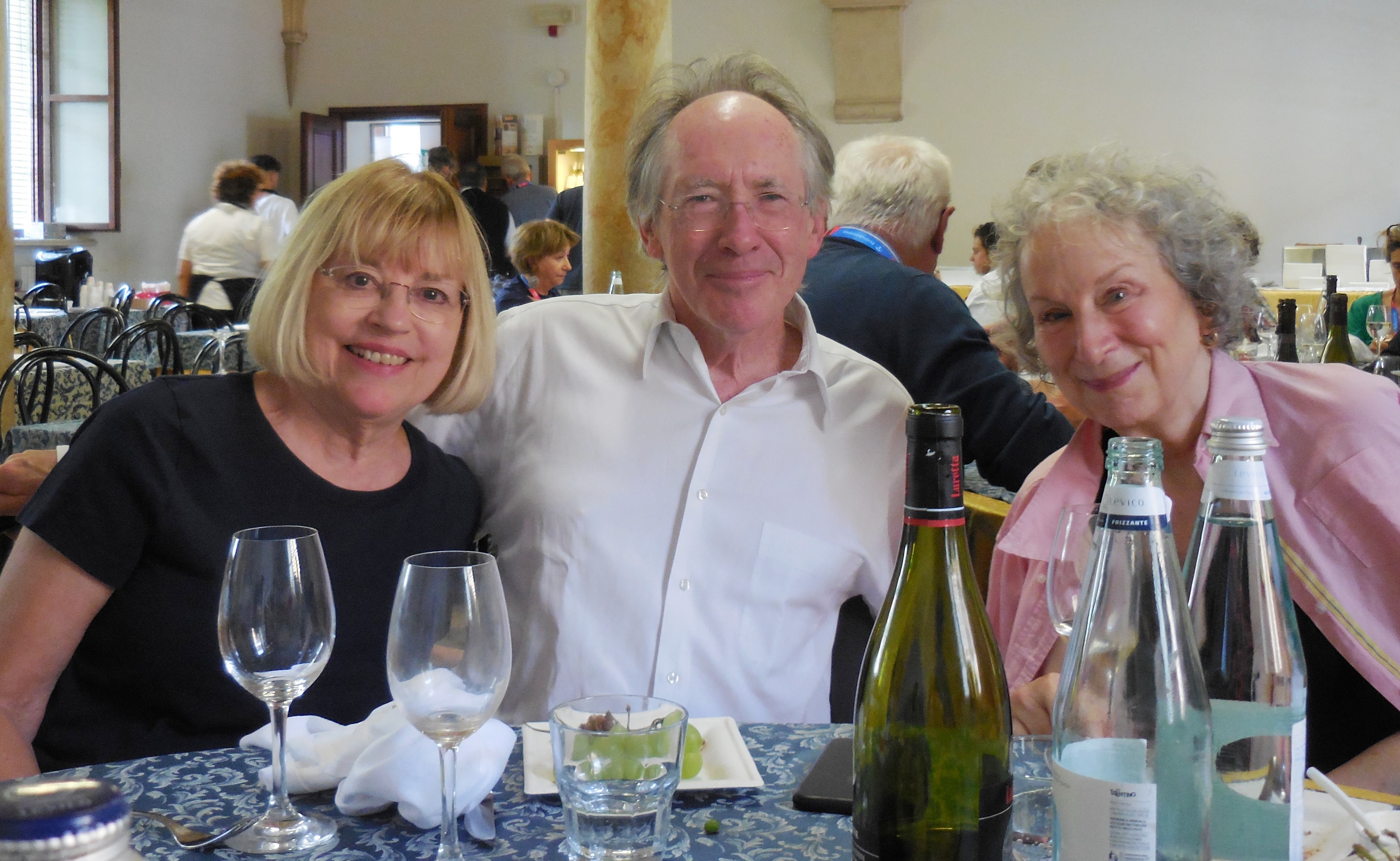
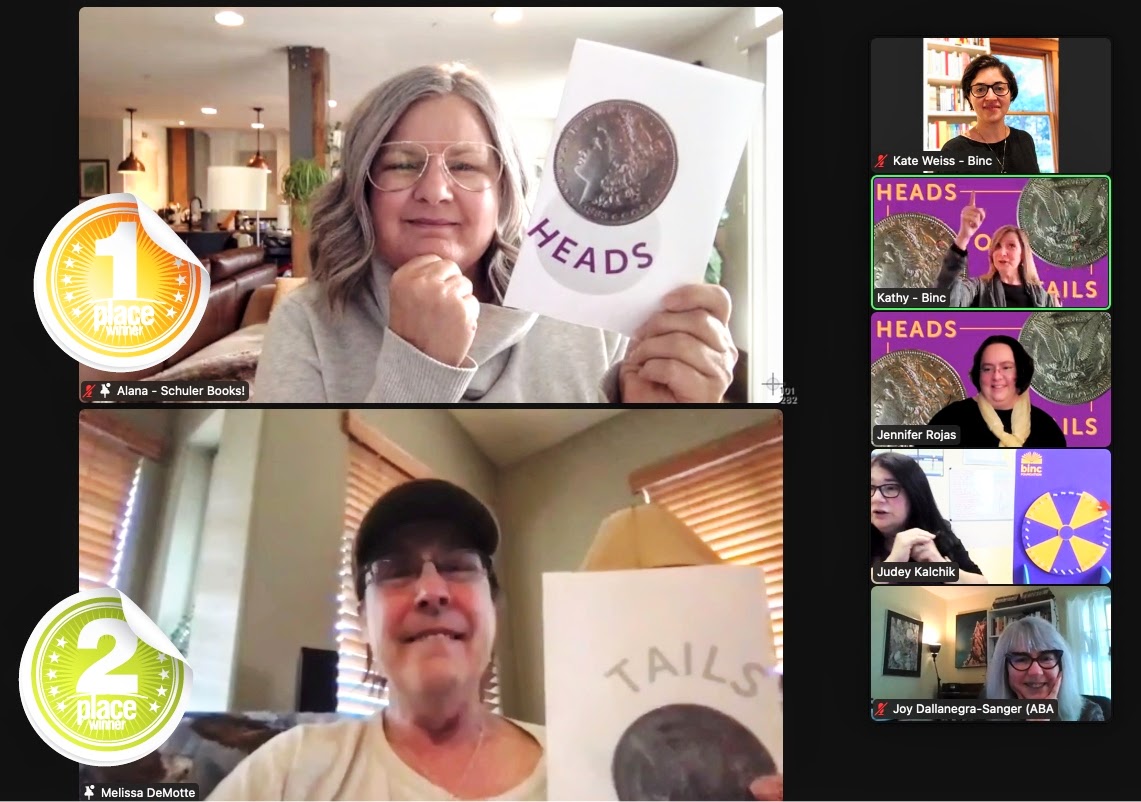 Yesterday, during ABA's Snow Days conference, the Binc Foundation hosted its popular Heads or Tails fundraiser. The game came down to two final players: Alana Haley from Schuler's Books, Grand Rapid, Mich., and Melissa DeMotte from The Well-Read Moose,
Yesterday, during ABA's Snow Days conference, the Binc Foundation hosted its popular Heads or Tails fundraiser. The game came down to two final players: Alana Haley from Schuler's Books, Grand Rapid, Mich., and Melissa DeMotte from The Well-Read Moose, 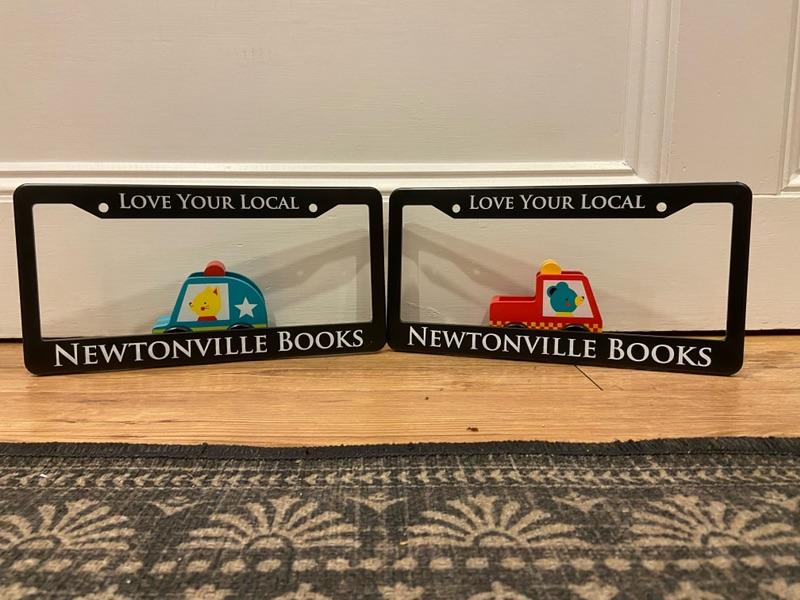
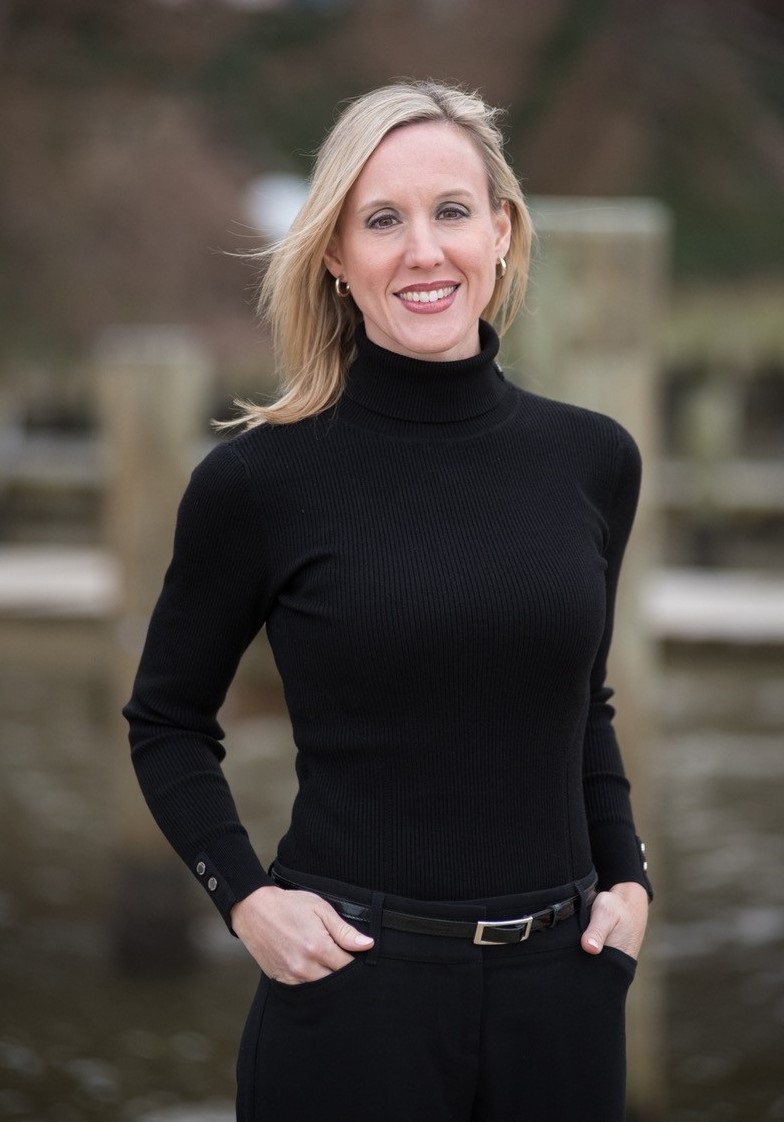
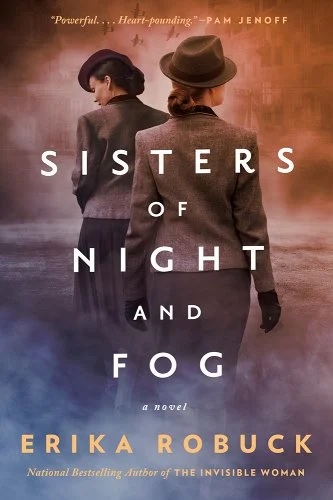 Book you've bought for the cover:
Book you've bought for the cover: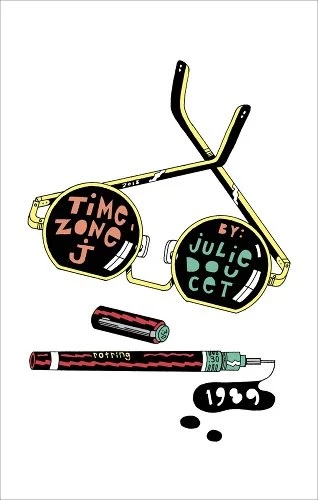 Julie Doucet is a legendary alternative comics pioneer, especially in an arena dominated by men. Her fame was further elevated by her frustrated abandonment of the industry in 2006. Her semi-autobiographical Dirty Plotte (quite the double entendre: "plotte" is Québécois slang for the c-word) began as a "photocopied fanzine" in the 1980s; it was published in the 1990s by graphics indie Drawn & Quarterly, which then released a fantastic double-volume boxed compilation in 2018.
Julie Doucet is a legendary alternative comics pioneer, especially in an arena dominated by men. Her fame was further elevated by her frustrated abandonment of the industry in 2006. Her semi-autobiographical Dirty Plotte (quite the double entendre: "plotte" is Québécois slang for the c-word) began as a "photocopied fanzine" in the 1980s; it was published in the 1990s by graphics indie Drawn & Quarterly, which then released a fantastic double-volume boxed compilation in 2018.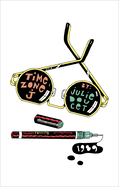
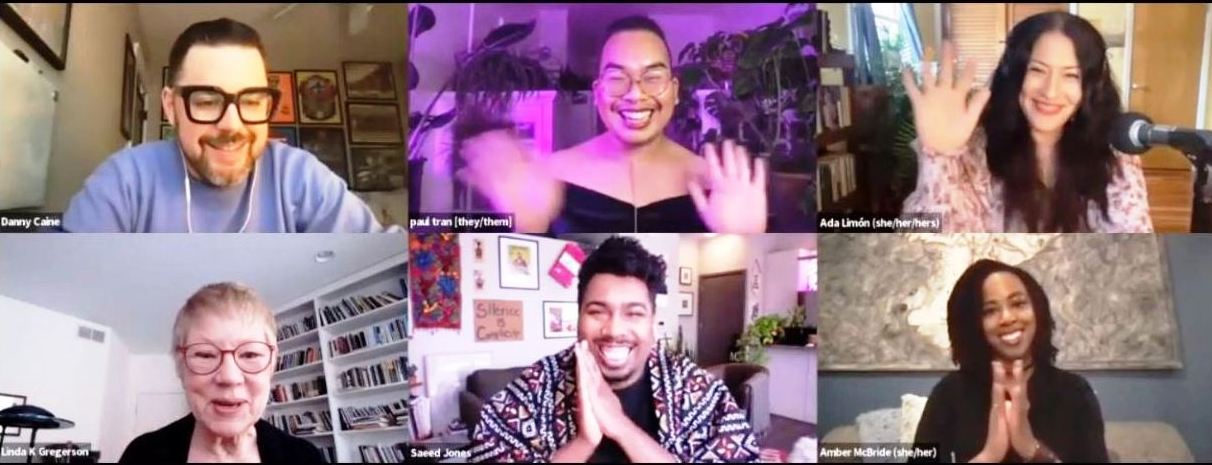 In the first segment, each poet was asked to describe the "journey to the book" for their latest collection and to share a poem. Their stories were intricate and compelling. If ever there was a genuine "you had to be there" moment, this was it. I'll resist the temptation to encapsulate the words they spun to make their new books irresistible. Trust me. Just read their poems.
In the first segment, each poet was asked to describe the "journey to the book" for their latest collection and to share a poem. Their stories were intricate and compelling. If ever there was a genuine "you had to be there" moment, this was it. I'll resist the temptation to encapsulate the words they spun to make their new books irresistible. Trust me. Just read their poems. 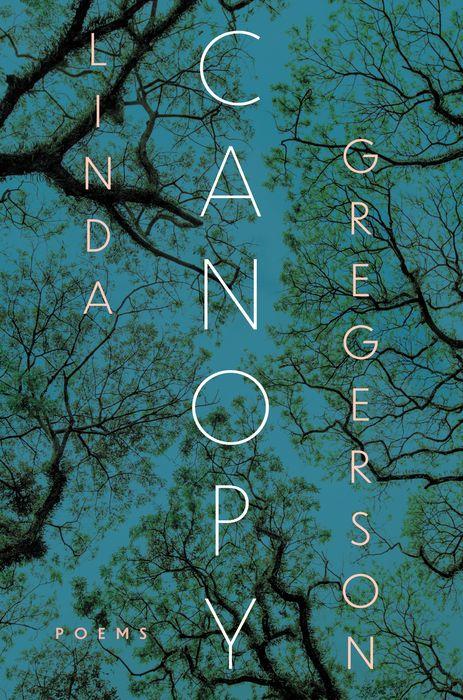 Gregerson, whose latest collection is Canopy (Ecco, March 22), observed: "There is something particular to poetry, and it's got to do with form and with distillation... with scale. I think there's so much inchoate happening in the world; it's coming at us all the time from every direction, through every medium.... Finding shape can be a profound consolation when the world is as it is, when we're deeply troubled, when there are some things that are just unbearable.... I say making shape, but It's also being found.... One of the things that I think is particular to the lyric poem is the way it's able to kind of ambush us. And I say that from both the point of view of the writer and the reader."
Gregerson, whose latest collection is Canopy (Ecco, March 22), observed: "There is something particular to poetry, and it's got to do with form and with distillation... with scale. I think there's so much inchoate happening in the world; it's coming at us all the time from every direction, through every medium.... Finding shape can be a profound consolation when the world is as it is, when we're deeply troubled, when there are some things that are just unbearable.... I say making shape, but It's also being found.... One of the things that I think is particular to the lyric poem is the way it's able to kind of ambush us. And I say that from both the point of view of the writer and the reader."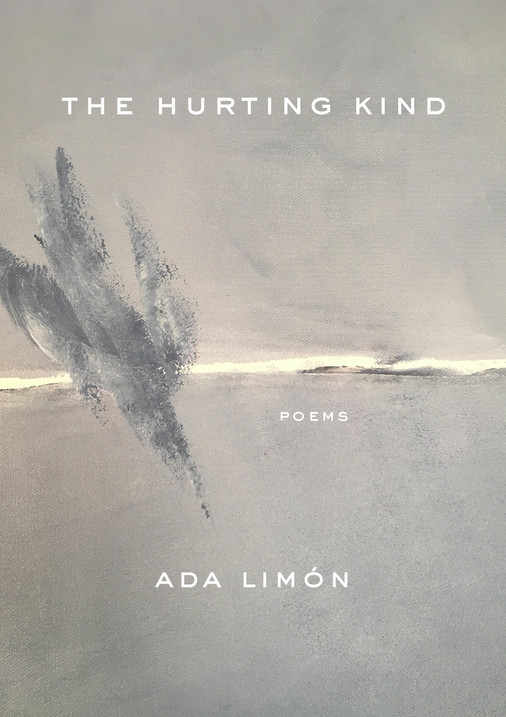 Limón, whose upcoming work is The Hurting Kind (Milkweed Editions, May 10), also believes "there are a lot of people who are turning toward poetry, and I think one of the reasons is that we are distrusting the old wisdom and the old ways. Poetry makes room for the liminal spaces. It makes room for the gray areas. It is not didactic. It is not binary. It makes an argument for the whole self, for wholeness, which is the entire mess.... I feel like that's what we are trusting in poetry right now. Because it isn't about certitude. And it isn't about wisdom. And it isn't about facts or something that we are somehow gaining to better one another, but instead really getting comfortable with the knowledge that the human experience is super-messy. We're turning to poetry because that makes sense."
Limón, whose upcoming work is The Hurting Kind (Milkweed Editions, May 10), also believes "there are a lot of people who are turning toward poetry, and I think one of the reasons is that we are distrusting the old wisdom and the old ways. Poetry makes room for the liminal spaces. It makes room for the gray areas. It is not didactic. It is not binary. It makes an argument for the whole self, for wholeness, which is the entire mess.... I feel like that's what we are trusting in poetry right now. Because it isn't about certitude. And it isn't about wisdom. And it isn't about facts or something that we are somehow gaining to better one another, but instead really getting comfortable with the knowledge that the human experience is super-messy. We're turning to poetry because that makes sense."_031022.jpg) McBride, whose YA novel-in-verse Me (Moth) is published by Feiwel & Friends, noted that "it's easy to say something is a moment when there's been so much work to that moment. I used to work for Furious Flower Poetry Center and that organization worked so hard to bring poetry, specifically Black poets, to the mainstream... [O]ne thing I do know is that there are teachers not teaching Shakespeare anymore. They're teaching people like Jason Reynolds, Jacqueline Woodson, who are writing in verse, and so kids are being introduced to poetry in a way that's more accessible so much younger. So when I get to my college students, they love poetry.... people are starting to catch on because of a younger introduction to it."
McBride, whose YA novel-in-verse Me (Moth) is published by Feiwel & Friends, noted that "it's easy to say something is a moment when there's been so much work to that moment. I used to work for Furious Flower Poetry Center and that organization worked so hard to bring poetry, specifically Black poets, to the mainstream... [O]ne thing I do know is that there are teachers not teaching Shakespeare anymore. They're teaching people like Jason Reynolds, Jacqueline Woodson, who are writing in verse, and so kids are being introduced to poetry in a way that's more accessible so much younger. So when I get to my college students, they love poetry.... people are starting to catch on because of a younger introduction to it."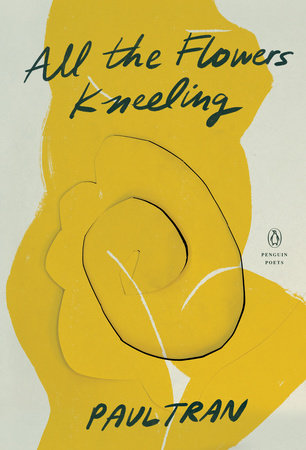 Tran, author of All the Flowers Kneeling (Penguin), said: "I do feel it's a golden moment. In what other moment could I have seen someone like myself publish a book of poems, to have someone say that they care about my story. And yet I also realize that this moment was made possible for me because writers and poets have been fighting for it. So maybe it's not a golden moment, but a golden tradition, a golden struggle....
Tran, author of All the Flowers Kneeling (Penguin), said: "I do feel it's a golden moment. In what other moment could I have seen someone like myself publish a book of poems, to have someone say that they care about my story. And yet I also realize that this moment was made possible for me because writers and poets have been fighting for it. So maybe it's not a golden moment, but a golden tradition, a golden struggle....